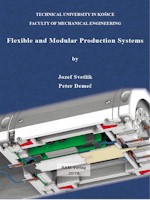|
 |
INTRODUCTION
Globalization has resulted in many changes on the market, also affecting industrial engineering. Characteristic features of this trend are a never-increasing competition on the world market, narrowed (in terms of time, finance) space for taking advantage of market opportunities and frequent changes (demand turbulence) in the demand for products. These trends (features) bring considerable risks to manufacturers, but also great opportuni-ties. In order to take advantage of these opportunities, the mechanical engineering sector must deliver production systems capable of producing a wider range of products within the relevant product group and category. For these reasons, the technology of flexible manu-facturing systems is becoming more widespread.
Flexible manufacturing systems have a well-established application in a rapidly changing manufacturing environment, characterized by sophisticated competition in a global context and by progressive changes in process technologies and their structure ac-cording to market requirements. Such systems necessitate rapid and factual integration of new technologies and new functions into both system and process relationships.
The outlined trends and their conditions and requirements call for a flexible approach to production to ensure:
• Operational adaptation of the production capacity of manufacturing systems to market requirements, i.e. achieving rapidly viable new products;
• Quick integration of modern process technologies and new features into the ex-isting manufacturing systems capable of easily adaptation to dynamically changing batches of individual products.
Lean production as a concept that originated in the 1990s in the US. Its philosophy has also successfully taken root in Slovakia [1, 2]. Lean production is based on the idea of shortening time between customer and supplier. It eliminates waste in the chain that links them. Lean production focuses on increasing the value defined by customer requirements.
The current state of affairs confirms that manufacturers who operate according to the principles of lean manufacturing have their own concept, including a set of tools, tech-niques and methods they use to work within this concept. The set of tools, methods and techniques is in many cases very similar, Fig. 1. [1]
Proper use of lean manufacturing tools to eliminate the basic types of waste is im-portant. The decisive point of the concept of such production is how its production systems are organized……..
